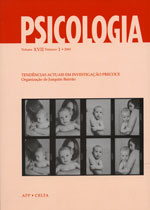Documenting delay and disability in early development with the WHO-ICF
DOI:
https://doi.org/10.17575/rpsicol.v17i1.437Keywords:
-Abstract
While initiatives to prevent or reduce development delay in young children are well established in Portugal and other European countries, inadequate documentation of childhood disability introduces significant variability in the description of children served in early intervention programs. This variability contributes to problems of standardizing eligibility criteria, uniform description of the population as well as to the derivation of incidence and prevalence estimates. A comprehensive method of documentation in needed that can encompass the dimensions of childhood disability and functional limitations in the first six years of life. The International Classification of Functioning, Disability and Health by the World Health Organization – ICF (WHO, 2001) may meet this requirement by providing a universal framework defining functioning, activities, participation and environmental factors. Given that children with disabilities also present with specific health conditions as well as functional manifestation of disability. To this end, an algorithm is described that integrates ICF and ICD – Conditions, Body, Functions & Structures, Activities and Participation and Environmental Factors. This classification approach has been applied in coding reasons for eligibility in the National Early Intervention Longitudinal Study in the US and has been successfully adapted for documenting characteristics of children in early intervention in Portugal.


